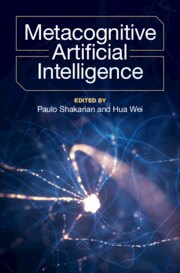Book contents
- Frontmatter
- Contents
- Contributors
- Acknowledgments
- Part I Introduction
- Part II Taxonomy of Metacognitive Approaches
- Part III Neuro-Symbolic Models in AI
- Part IV Metacognition with LLMS
- 7 Metacognitive Intervention for Accountable LLMs through Sparsity
- 8 Metacognitive Insights into ChatGPT’s Arithmetic Reasoning
- Part V Metacognition in Learning Agents
- Part VI Assured Machine Learning in High-Stakes Domains
- Part VII Metacognition as a Solution to Handle Failure
- Part VIII Applications of Metacognitive AI
7 - Metacognitive Intervention for Accountable LLMs through Sparsity
from Part IV - Metacognition with LLMS
Published online by Cambridge University Press: 08 September 2025
- Frontmatter
- Contents
- Contributors
- Acknowledgments
- Part I Introduction
- Part II Taxonomy of Metacognitive Approaches
- Part III Neuro-Symbolic Models in AI
- Part IV Metacognition with LLMS
- 7 Metacognitive Intervention for Accountable LLMs through Sparsity
- 8 Metacognitive Insights into ChatGPT’s Arithmetic Reasoning
- Part V Metacognition in Learning Agents
- Part VI Assured Machine Learning in High-Stakes Domains
- Part VII Metacognition as a Solution to Handle Failure
- Part VIII Applications of Metacognitive AI
Summary
Currently, there is a gap in the literature regarding effective post-deployment interventions for LLMs. Existing methods like few-shot or zero-shot prompting show promise but lack certainty in post-prompting performance and heavily rely on human expertise for error detection and prompt crafting. Against this backdrop, we trifurcate the challenges for LLM intervention into three folds. First, the ``black-box’’ nature of LLMs obscures the malfunction source within the multitude of parameters, complicating targeted intervention. Second, rectification typically depends on domain experts to identify errors, hindering scalability and automation. Third, the architectural complexity and sheer size of LLMs render pinpointed intervention an overwhelmingly daunting task.
Here, we call for a novel paradigm for LLM intervention inspired by cognitive science principles. This paradigm aims to equip LLMs with self-awareness in error identification and correction, emulating human cognitive efficiency. It would enable LLMs to form transparent decision-making pathways guided by human-comprehensible concepts, allowing for precise model intervention.
Information
- Type
- Chapter
- Information
- Metacognitive Artificial Intelligence , pp. 111 - 120Publisher: Cambridge University PressPrint publication year: 2025
